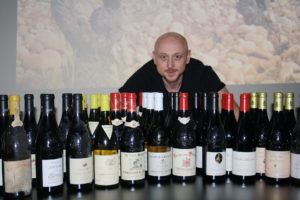Thanks to the generosity of the Belgian Tourist Office for Brussels and Wallonia in New York, I spent four wonderful days in the city of Mons, the capital of the Belgian province of Hainaut near the French border, and of European Culture in 2015. I had assignments to write about the exceptional museums there and nearby, the annual Doudou religious festival which has taken place there almost every Trinity Sunday since the 14th century, the First World War Cemetery of Saint Symphorien, where German and British soldiers are buried side-by-side, and to interview the owners of the best local restaurant “Les Gribaumonts”. Lisa Calcus, the chef, and her husband Nicolas Campus, the sommelier, are members of the Belgian Chapter of the Jeunes Restaurateurs D’Europe. Lisa Calcus was voted Belgium’s Best Lady Chef for 2012.
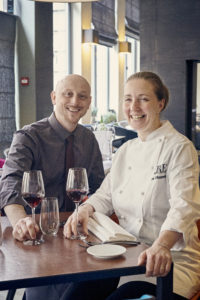
Nicolas and Lisa
LISA CALCUS: BELGIUM’S LADY CHEF OF THE YEAR 2012
Our tastes in food are closely connected to our childhood; what are your first memories of food?
The pies my grandmother, my father’s mother, made with the fruits from my grandfather’s garden, especially her rhubarb pies.
What is the meaning of Gribaumonts?
We moved here to Mons five years ago. Gribaumonts was the name of the place, where for 18 years, we had a restaurant, also named Gribaumonts. It’s the place I grew up twenty kilometers from Mons. We kept the name because it was easier for our faithful guests to find us. Our goal is always to surprise and please our guests.
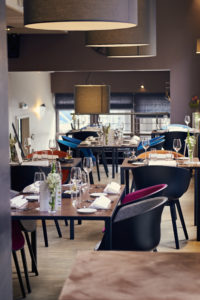
Who was your mentor? What did you learn from him or her?
I didn’t really have a mentor. I went to hotel school in Namur and immediately after graduation opened my restaurant “Les Gribaumonts” in our family home in Gribaumonts. My parents still live there. I’ve never worked in someone else’s restaurant. I was nineteen. When there were a lot of guests on weekends, my mother helped me in the kitchen, but usually I worked alone. It was too quiet during the week. That’s why we moved to Mons.
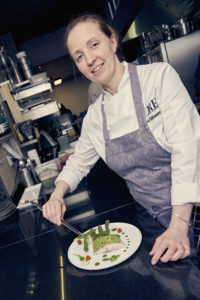
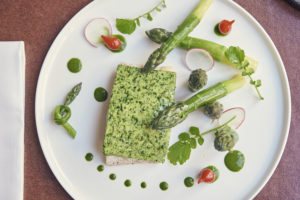
When you decided to become a chef were your parents happy?
Yes. It was my father, a successful businessman, who suggested we convert part of our home into a restaurant for me. I’m an only child.
Your nickname is “la grande dame de demain”, but you are already great. How much greater can you get?
There is always room for improvement. I can perfect something or learn something new. I prefer being “the great of today”. I like seeing my guests leave with a big smile on their faces.
You and your husband Nicolas Campus your sommelier seem the perfect match; when did you start working together?
He was one year behind me in hotel school in Namur. After his graduation he came to work with me and we’ve been together ever since.
You and Nicolas spend 24 hours a day together; what do you love best about him?
It was certainly love at first sight. He’s always smiling, always in a good mood. He’s serene and very positive.
Is it difficult to work with him day-in and day-out?
We support each other. We complement each other. We’re really in two different fields.
What about him can irritate you?
Sometimes he talks too much.
In a nutshell how would you define your cuisine?
Immediate inspiration, last-minute inventions, seasonal, kilometer 0 ingredients except for fish, which we buy from France, light, never heavy, digestible. I try to use only local products except for fish naturally. I work with lots of spices, herbs, and teas. I hardly ever use butter or cream.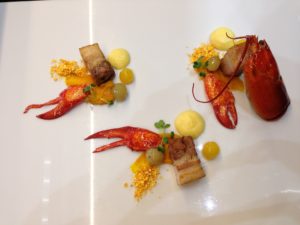
What is your culinary philosophy?
Back to Basics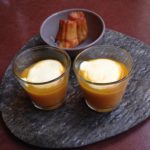
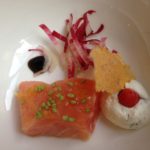
What is Belgian about your cuisine?
My ingredients: local fresh products from the local market. I go to the market myself here in Mons.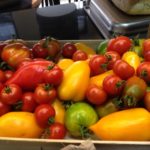
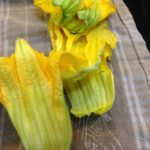
What are your specialties?
Lobster, sweetbreads, squab, but I change my menu very often, almost every day. I love to make fruit pies like my grandmother’s.
What are the essential qualities of a top chef?
Self-discipline, tenacity, imagination, passion…
When did you discover that you wanted to be a chef?
When I was between 8 and 10 years old at my grandparents. I spent my summer holidays with them in Wanze near Huy. My grandfather had a magnificent vegetable garden and lots of fruit trees. There was a lot of work to be done outside with him during the day and then evenings in the kitchen with my grandmother making jams, preserves, and pies. My mother is an excellent cook too. Cooking came naturally to me. Perhaps it’s in my DNA.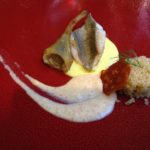
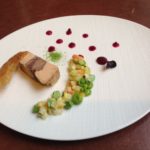
What do you like most about your work?
I’ve always loved to cook no matter what it is except perhaps game.
The least?
The paperwork.
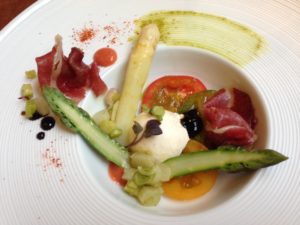 Other chefs you admire?
Other chefs you admire?
I’ve never worked with other chefs and I’m always here so I can’t give you an answer.
Do you think it’s more difficult for a woman to be a top chef than for a man?
It wasn’t for me, but usually yes because of the long hours.
Your feelings about restaurant guides?
They’re always a help especially for tourists who are in a new place and don’t know which restaurant to choose.
Up to now we have talked about Lisa Calcus the chef; I’d like to know more about Lisa Calcus the person. For example, what are your favorite foods to eat? To cook?
I eat everything, but I like vegetables especially. The same is true of my cooking: I like to work with vegetables, the ones in season, of course. I like to work with farmers and producers.
A dish you dislike?
Innards. Tripe.
Your favorite wines?
What Nicolas suggests. He knows best.
When Nicolas chooses a wine to accompany one of your dishes, do you always agree with his choice?
Usually, yes. That’s his field. He’s very well prepared. He knows so much—much more than me-about wine. He’s always researching new wineries and new production techniques.
Your favorite dessert?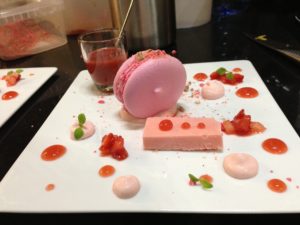
Homemade fruit pies.
Your favorite color?
Green.
What is never missing from your refrigerator at home?
Fruit.
Chefs are well-known for having collections of fast cars, motorcycles or watches; do you have a collection?
Little pigs, made of everything.
What zodiac sign are you?
Leo. Nicolas is Pisces.
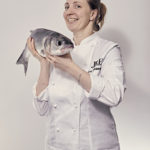
If you had not become a chef what profession would you have chosen?
Florist.
Your favorite flower?
Peony.
Do you have a pipe dream?
Maybe our next restaurant—one smaller than this one, with a table d’hôte. Just for inviting our friends. It’s for when we retire.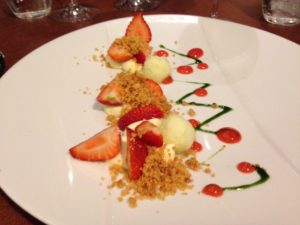
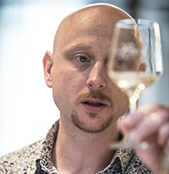
NICOLAS CAMPUS: AN INDEFATIGABLE SOMMELIER
Your first memories of wine?
When I was about 17 or 18. My first love were the wines of the North Rhône near Vienne, between Vienne and Tain L’Hermitage, south of Lyons: Les Côtes de Rhône.
How did you happen to go there?
Lisa’s father. He introduced me to good wines.
So why did you choose to become a sommelier?
After my future father-in-law’s introduction, I always wanted to learn more so I took all the courses possible to become a sommelier. But the job of sommelier doesn’t stop with graduation from school. It’s a profession that grows with each passing day. It’s very personal. It means networking with other sommeliers and wine producers and constantly going to tastings. I go often to France, but lots of wine producers come to Belgium, to Brussels, Antwerp, Ghent, here in Mons, for professional tastings, to promote their wines. There’s one almost every week. I’m curious so I go. I’ll never stop learning.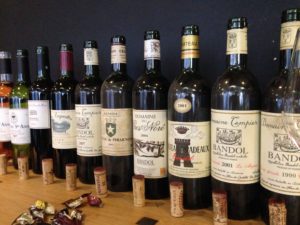
Before meeting my future father-in-law wine didn’t attract me. It was a drink like any other. At that age I preferred beer. It’s logical. We’re in Belgium. Beer is much cheaper. In my family, we didn’t drink much. For that reason I didn’t have opportunities to discover top wines.
Is your cellar here at “Les Gribaumonts” exclusively of French wines?
Up to three years ago I opened all possible doors to discover the world of wines. After that I limited my interest to autochthonous wines, indigenous wines that explain, express, reflect their native territory. In French we say terroir. There’s a history behind each of such wines and their producers. These producers respect their soil, treat their grapes in a non-conventional way, and produce their wines in a traditional healthy manner without high technology and chemical preservatives. The wines’ bouquets reflect the soil and their grapes. There are two ways to make wine. One type is made by the winemaker. Wines from Bordeaux are all constructed by the winemaker. They are assemblages. I like wines that are made by nature not by man.
Here in Mons I have two wine cellars. One is for the restaurant; the other is for storage. All together I have c. 10,000 bottles. It’s only three years that I’ve been collecting. 70% are French. The rest are almost all European: Italian, German, Austrian, Hungarian, Bulgarian, Spanish and Portuguese. I don’t have American, Australian, or New Zealand wines because they are all constructed thanks to science; they have no history of the origins. The terroir of most European wines is their secret.
Besides your father-in-law, who was your mentor?
My spiritual mentor is the sommelier Carlo Zecchin, the sommelier of the restaurant “Les Gourmands” at Blaregnies not far from here. He’s Italian, from Piemonte. He has an awesome culture about wine, a very polished taste. He’s a legend. He certainly helped me to be where I am today. Now we have the same clients. What I like in a sommelier is his or her humility, honesty, not a lot of hot-air, overblown, useless longwinded explanations. The sommelier should only explain the essentials. A wine must be good. You must like it but not because someone tells you to. That’s the crux.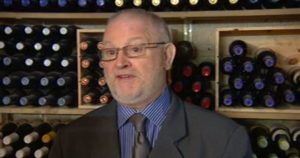
So what are the essential qualities for becoming a top sommelier?
Listen to your guest, figure out his or her personality and tastes, surprise your guest but not necessarily by giving him or her what he or she wants, introduce the guests to wines unknown to them before or that have gone out of style because of technology.
What do you like most about your work?
Finding the best matches for Lisa’s menu of that meal and when our guests say thank you.
The least?
The inability to please a guest. But since I love my work, I don’t usually have this problem.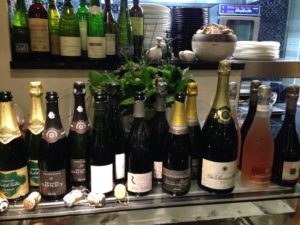
Your opinion of restaurant guides?
Did you ask my wife the same question? They are part of the sad state of reality. Yes, they help you to work in the sense of publicizing the restaurant, getting the word out to people who wouldn’t otherwise know about us. But for me the most important judges of “Les Gribaumonts” are the very high percent of our guests who come back and come back again and again. We work mainly thanks to word-of-mouth, thanks to the recommendations of our loyal guests.
Up to now we have talked about Nicolas Campus the sommelier; now I would like to know more about Nicolas Campus the person. For example, do you have a favorite food?
I like everything that is good. I like to change, try new dishes. I like so many dishes. I like roast chicken, wild mushrooms, eggs, herbs, wild salads.
A dish that Lisa makes that you like the most?
Everything she makes is delicious, but my favorite is her risotto, though she never makes the same risotto twice. Her risotto with seasonal ingredients is to-die-for, wild mushrooms, fresh peas, just Parmesan cheese and olive oil, fresh tomatoes…to name a few.
A food you’ve always disliked?
That’s difficult. A food I find insipid, insignificant are cucumbers. They have no personality. It’s not that I don’t like them or eat them, but I don’t find them exceptional.
Your favorite wines?
It depends on the moment, the season, the occasion, the time of day. With oysters a top Muscadet; with cheese a top Vin Jaune.
Your favorite dessert?
Chocolate mousse.
Your favorite color?
I’ve never asked myself that question. I guess blue because it’s the color of the sea in all senses of the word: the weather, the pleasure, adventure, the horizon.
When you choose a wine for one of Lisa’s dishes, do you always agree?
Almost always, but occasionally she adds or removes an ingredient from her dish because otherwise the fusion between food and wine wouldn’t be there. Sometimes she doesn’t agree with my choices of aged wines.
Lisa told me that she sometimes gets irritated with you because you talk too much; is that true?
Yes, but not with her.
What do you love about Lisa?
Her extraordinary energy. I love what she is: a force, a forceful temperament, someone who is a fighter for what she wants; she never stops.
What irritates you about Lisa?
Two things: One: that she keeps me on tenterhooks, that sometimes she doesn’t decide what to cook until nearly lunchtime which makes it hard for me to decant the appropriate reds. Two: That she never stops. This characteristic can be positive and negative.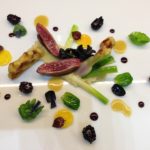
I don’t know about sommeliers, but chefs are well-known for having collections of motorcycles, fast cars, and expensive watches. Do you have a collection?
When I was young, I started a collection of beer coasters. I liked beer very much then. Sadly now I don’t have time. I’m too taken up with my work. My work is my passion.
If you had not become a sommelier, what profession would you have chosen?
I think, like my father, a doctor. I like to take care of people.
Do you have a pipe dream?
That I will live to see the world at peace. That I will get better and better at satisfying my guests. That all wines will respect their terroir, will be made by nature and not by the winemaker.